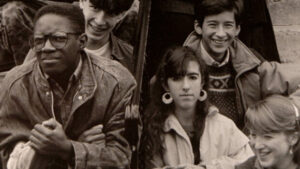by The Cowl Editor on November 2, 2017
Arts & Entertainment

by Alexis Jais ’18
A&E Staff
On Oct. 27, Providence College welcomed independent filmmaker André Robert Lee, director and producer of the profound, yet unfortunately un-publicized film The Prep School Negro.
Lee is a seasoned independent filmmaker who entered the world of film and entertainment via a complex and enlightening history.
The goal of this particular film is to foster some understanding among the general population the feelings and difficulties associated with being a black person in a “white person’s world.” The Prep School Negro particularily focuses on the challenges minorities in the academic sector and how demographic factors deturmine who is allowed to have mobility in our society.
Lee has produced six films, and both directed and produced, his 2012 film The Prep School Negro. In this film, Lee delves into his past as a child coming from a low-income family.
He received a scholarship to a prestigious preparatory school in Philadelphia in the early 1980s and battled feelings of inferiority and hopelessness about his future. In the film, Lee revisits the Germantown Friends School to recall some of the memories he had as a student there, and also to discover how perspectives have changed in students at the school these days.
In the film, Lee remembered his time at the private Quaker-founded school in ways that could sound eerily familiar to many young black people in a similar situation. He sat next to children in class whose names were those of big factory and department store owners, one of which his mother worked at as a line-worker.
Lee revealed in the film that he felt constantly pressured to be “twice as good” since he was not white, so he became the president of every group he could at school. He was saddened by the fact that regardless of how hard he tried, he might never be able to have the mobility he could have if he were white.
Although we have progressed 40 years into the future, the disheartening sight of our world’s racial dynamics would suggest otherwise. Still, Lee’s intimate look into the past of just one child provides an incredibly important lens through which we can now try to view the societies we live in and the people we interact with each day.
His presence at PC was crucial, and the College community needs to see more exhibits like his and hear the voices of people who were once in the position we are all in right now, whether or not we are of different skin colors.
Awareness helps develop our introspection so that we can judge and alter our own behaviors to make the communities we live in advantageous for everyone, and not just a certain few.